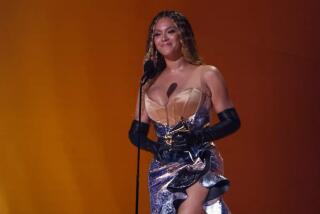Ticketmaster accused of selling ‘phantom’ Springsteen tickets
- Share via
Bruce Springsteen fans who bought seats for a hugely popular “Working on a Dream” concert last year were sold “phantom tickets” that Live Nation Entertainment Inc.’s Ticketmaster unit didn’t have in hand, according to the Federal Trade Commission.
The federal agency, which had accused the company of “deceptive bait-and-switch tactics,” Thursday denounced the practice, which left hundreds of would-be concertgoers without tickets they thought they had legitimately purchased on Ticketmaster’s TicketsNow resale site.
In a settlement, Ticketmaster agreed to stop the practice. The company did not admit to wrongdoing.
“Ticketmaster kept the sales proceeds,” the FTC said in a statement, “without a reasonable basis for believing it could fulfill the orders.”
As an example cited by the FTC, the same set of 38 tickets for the Springsteen concert in Washington were sold and resold 1,600 times.
Some consumers -- many of whom had gotten receipts for the tickets that included seat locations -- were not informed about the problem for as long as three months.
“Getting your money back two weeks before the concert is not a satisfactory resolution,” said Heather Hippsley, assistant director of enforcement for the FTC’s consumer protection division.
“The problem is that the consumer was not told immediately that there’s a risk here.”
FTC Chairman Jon Leibowitz said in a statement, “Buying tickets should not be a game of chance.”
Live Nation, which merged with Ticketmaster last month, declined requests for an interview but issued a statement saying it appreciated “the FTC’s diligence in closely investigating this matter.”
Stephen Happel, an economics professor at Arizona State University who specializes in the ticket resale market, said deception hurts the ticket industry.
“This rocks the very foundations of the marketplace,” he said. “You’re destroying trust among consumers.”
The practice came to light last year, when Springsteen criticized Ticketmaster for its handling of sales for concerts in May and June.
Fans who raced online to buy tickets from Ticketmaster in the initial hours of sales were met with the message “no tickets found.” They were redirected to the TicketsNow reseller site, where tickets were sold at prices of up to $400 -- a dramatic premium over the $90 face value, the FTC said.
“Many consumers had no idea what was going on,” Leibowitz said.
Leibowitz estimated that the settlement, which also called for overages to be refunded for 14 concert dates, could cost Ticketmaster as much as $1 million.
Ticketmaster also displayed the same misleading Web page to consumers looking to buy tickets for many other events from October 2008 to February 2009, the agency said.
Leibowitz said his agency was sending out warning letters to 10 other major ticket resellers, recommending that they review their websites “to ensure that you are not making any misleading statements or failing to provide material information to prospective purchasers of tickets listed on your site.”
Leibowitz declined to identify the sites.
Ticketmaster, he said, “seems to me by far the worst part of what we found.”
Happel said it’s not uncommon for brokers to offer to buy tickets for an event for which tickets aren’t yet available -- say, for next year’s Super Bowl. But brokers would never send out confirmation notices -- as the FTC alleges Ticketmaster did in some cases.
“It can get you into such trouble,” he said.
dawn.chmielewski@
latimes.com
More to Read
The biggest entertainment stories
Get our big stories about Hollywood, film, television, music, arts, culture and more right in your inbox as soon as they publish.
You may occasionally receive promotional content from the Los Angeles Times.










